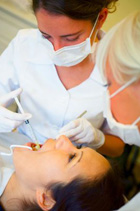 There are many conditions that affect us when we sleep. Two of the most common are snoring and sleep apnea. Both of these affect the way we sleep and can cause associated health problems during the day. Another less common but also debilitating sleep disorder is known as bruxism.
There are many conditions that affect us when we sleep. Two of the most common are snoring and sleep apnea. Both of these affect the way we sleep and can cause associated health problems during the day. Another less common but also debilitating sleep disorder is known as bruxism.
This involves sub-conscious teeth grinding that can cause enormous damage to the tooth enamel leading to long-term dental damage. It also causes many muscular problems to do with the head, neck and jaw. Bruxism can also be very disturbing for partners who share the same bed but there are easy ways to treat it.
For years it was assumed that bruxism was caused by stress or anxiety during your waking life. In some cases this is still true but dentists have successfully proven that the majority of cases are caused by a misalignment of the teeth or jaw. Incorrect alignment can lead to great discomfort that manifests itself as sub-conscious grinding. The muscular spasms that cause the grinding can be continual and over time will wear away the protective tooth enamel on the surface of the teeth. Once this enamel has been damaged or destroyed it cannot be replaced and exposes the teeth to many problems such as infections and even permanent loss.
Central Leeds dentists can prevent bruxism by fitting a specially designed mouth guard to be worn when sleeping. This protects the teeth from further damage while dentists try to reconfigure the jaw to correct any alignment issues. This is a complex process but one that can be achieved through various dental appliances.





 There are many reasons to choose to have a teeth whitening treatment from a Leeds dentist. The most obvious and probably most popular,is to make yourself look more attractive and boost self-esteem. Having stained or discoloured teeth can ruin the appearance of your smile and make you look much older than you actually are. This is because teeth tend to change colour naturally over time, becoming less white. So the whiter your teeth, the younger you appear to be, within natural limitations of course.
There are many reasons to choose to have a teeth whitening treatment from a Leeds dentist. The most obvious and probably most popular,is to make yourself look more attractive and boost self-esteem. Having stained or discoloured teeth can ruin the appearance of your smile and make you look much older than you actually are. This is because teeth tend to change colour naturally over time, becoming less white. So the whiter your teeth, the younger you appear to be, within natural limitations of course. It is fairly common knowledge that sweet and sugary foods are bad for you teeth because they cause plaque and bacteria to stick to the surfaces of the teeth and gums where they do most damage. Sugary and starchy foods also react with the plaque to release acid, which erodes the gum tissue and tooth enamel. This causes gum disease and dental cavities leading to many dental health problems such as abscesses and infections, and even ultimately tooth loss. The main problem with sweet foods is that they are especially difficult to resist, especially for children who really need to look after their teeth. Sweet foods can also be responsible for bad breath as they encourage the growth of bacteria and associated sulphurous acids.
It is fairly common knowledge that sweet and sugary foods are bad for you teeth because they cause plaque and bacteria to stick to the surfaces of the teeth and gums where they do most damage. Sugary and starchy foods also react with the plaque to release acid, which erodes the gum tissue and tooth enamel. This causes gum disease and dental cavities leading to many dental health problems such as abscesses and infections, and even ultimately tooth loss. The main problem with sweet foods is that they are especially difficult to resist, especially for children who really need to look after their teeth. Sweet foods can also be responsible for bad breath as they encourage the growth of bacteria and associated sulphurous acids. You should never take your teeth for granted. It is important to keep up good standards of oral health and report any problems to your dentist as soon as possible. Here are some tips on taking good care of your teeth.
You should never take your teeth for granted. It is important to keep up good standards of oral health and report any problems to your dentist as soon as possible. Here are some tips on taking good care of your teeth. Plaque is the soft, sticky substance that surrounds the teeth. It is mostly made from bacteria and releases acid that dissolves minerals in the enamel of the tooth, causing dental cavities, tooth decay and infections. Plaque that builds up around the gums can break down gum tissue leading to painful gum disease, which results in bleeding and possibly even heart disease. It is therefore very important to keep plaque under control with effective brushing and flossing at home.
Plaque is the soft, sticky substance that surrounds the teeth. It is mostly made from bacteria and releases acid that dissolves minerals in the enamel of the tooth, causing dental cavities, tooth decay and infections. Plaque that builds up around the gums can break down gum tissue leading to painful gum disease, which results in bleeding and possibly even heart disease. It is therefore very important to keep plaque under control with effective brushing and flossing at home. Looking after you teeth is one area where it is very true that prevention is better than cure. Although a large number of people are either afraid or ‘too busy’ to visit the dentist, it may turn out to be one of the worst decisions you’ll ever make.
Looking after you teeth is one area where it is very true that prevention is better than cure. Although a large number of people are either afraid or ‘too busy’ to visit the dentist, it may turn out to be one of the worst decisions you’ll ever make. Bad breath can be a very embarrassing problem, and not just for you but also for those around you. People who suffer from bad breath are also at times unaware because it can be very difficult to tell if you are suffering from the condition. This can often lead to very awkward situations where someone has to tell you your breath smells.
Bad breath can be a very embarrassing problem, and not just for you but also for those around you. People who suffer from bad breath are also at times unaware because it can be very difficult to tell if you are suffering from the condition. This can often lead to very awkward situations where someone has to tell you your breath smells.

